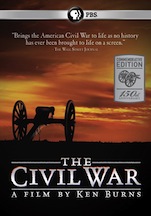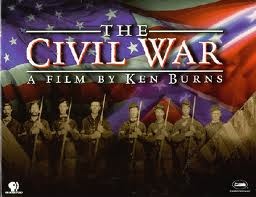Telling History vs. Making Art: Communicating “the incommunicable experience of war”
 Part seven in a series
Part seven in a series
“We have shared the incommunicable experience of war,” Oliver Wendell Holmes says at the beginning of Ken Burns’ documentary The Civil War. Burns could not have picked a more appropriate quote to start his film with, not just because it set a particular tone for the entire eleven-hour documentary but because it would describe the viewing experience of the documentary itself. For a week, some forty million Americans tuned in to public televisions to watch Burns’ film—a shared media experience so profound that one book says, “For a generation of Americans, this documentary is the Civil War.”[1]
Holmes’ words were appropriate, too, because the war remained largely incommunicable. “Ken Burns encountered thousands of ‘facts’ about the war in the form of pictures, letters, statistics, maps, and other kinds of evidence,” points out historian Robert Brent Toplin. “He could easily have turned his eleven-hour documentary into a 100-hour or 200-hour film, and still he would have to leave out much interesting material.”[2]
 Critics pounced on Burns for what he left out (information about social history, for instance) and for what he put in (too much traditional focus on battles and leaders).[3] “In The Civil War, despite the abundance of images and resources at the command of the filmmakers, that social upheaval is never played out with the same depth, the same sensitivity, the same emotional and dramatic intensity as the military engagements,” contends Litwack.[4] He criticizes what he sees as Burns’ choice to focus on the Reunification tradition. “The nation had been reborn, and it is this rebirth that Ken Burns chooses to celebrate in The Civil War,” he says, calling it the “most appalling and revealing shortcoming” of the film.[5]
Critics pounced on Burns for what he left out (information about social history, for instance) and for what he put in (too much traditional focus on battles and leaders).[3] “In The Civil War, despite the abundance of images and resources at the command of the filmmakers, that social upheaval is never played out with the same depth, the same sensitivity, the same emotional and dramatic intensity as the military engagements,” contends Litwack.[4] He criticizes what he sees as Burns’ choice to focus on the Reunification tradition. “The nation had been reborn, and it is this rebirth that Ken Burns chooses to celebrate in The Civil War,” he says, calling it the “most appalling and revealing shortcoming” of the film.[5]
Historian Eric Foner agrees. “In choosing to stress the preservation of the American nation state as the war’s most enduring consequence, Burns privileges a merely national concern over the great human drama of emancipation,” Foner says, vitriolic that Burns ignored the Emancipation tradition.[6] Others accused him of embracing the Lost Cause tradition. Some “saw only capitulation to an ‘old’ narrative pro-southern version of history,” Burns lamented.[7]
Part of it, Burns suggested, might relate back to expectations. “Had they forgotten the difference between literary scholarship and the demands of a popular medium?” he wondered.[8]
The film’s principle writer, Geoffrey C. Ward, admitted that “it was only the special demands of documentary filmmaking that kept us from doing still more” in the film than they did.[9] “Time imposes crippling restraints,” he said, outlining other issues, as well: “Before anything else, film demands something to look at…. And, just as sadly, there is precious little written evidence of the sort we would have needed to fill our script.”[10] He also pointed out that “Television is better at narrative than analysis, better at evoking emotions than expounding complex ideas.”[11]
Next: “Story is a central part of the word ‘history'”
[1] From the text on the back cover of Robert Brent Toplin’s Ken Burns’s The Civil War: Historians Respond.
[2] Toplin, Robert Brent. “The Civil War as an Interpretation of History.” Ken Burns’s The Civil War: Historians Respond. Robert Brent Toplin, ed. New York: Oxford University Press, 1996. Pg. 21.
[3] Toplin, vi.
[4] Litwack, 128.
[5] Litwack, 135, 134.
[6] Foner, Eric. “Ken Burns and the Romance of Reunion.” Ken Burns’s The Civil War: Historians Respond. Robert Brent Toplin, ed. New York: Oxford University Press, 1996. Pp. 105-6.
[7] Burns, Ken. “Four O’Clock in the Morning Courage.” Ken Burns’s The Civil War: Historians Respond. Robert Brent Toplin, ed. New York: Oxford University Press, 1996. Pg. 172.
[8] Burns, 173.
[9] Ward, 146.
[10] Ward, 148, 146, 147.
[11] Ward, 148. At least public television makes an attempt. As Gary Gallagher suggests, no one in Hollywood, would insist that a historical film “reflect the insights of the best recent scholarship—at least not anyone who hopes to attract and satisfy paying customers.” (Gallagher, 9)
There were plenty of emotion – invoking images of slavery. Ken Burns’ documentary is truly a masterpiece, as I have told him in person.
I agree: it’s a great piece of art. And, I think, well-told history, too.
I suspect Ken Burns’ critics would have been happy only if Burns had filmed them talking for 2 hours.
I do know some historians like that….
The nitpicking is annoying. This was a stirring and remarkable film, which made the war accessible to millions. If there was an emphasis on reunion, is that not because reunion at the expense of social justice was a historical fact? The scholarship on the failures of Reconstruction is ample. Mr. Burns focused on the war itself and created a masterpiece.
I think it would’ve been possible to somehow point out that social justice DID come at the expense of reunion rather than just adopt the reunion perspective–but any sort of substantial discussion about that gets into a fuller discussion of Reconstruction, and the film was not about Reconstruction.